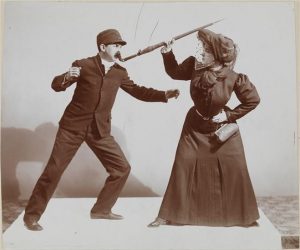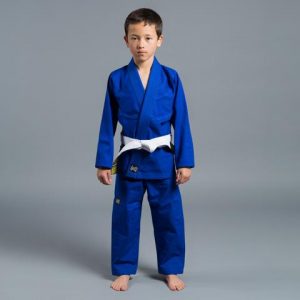Hoo boy, I know we’re going to be opening a can of worms with this one! However, this is a really important topic to cover, and I’m going to do my best to do justice to the discussion.
Whether BJJ is designed for self defense (or not) is one of the longest-running debates in the community. It’s not uncommon to see people who have been part of the sport for a long time claiming that “new school” BJJ has actively harmed the self-defense aspect of the sport; it’s also not uncommon for people who are active in the competitive “sport” BJJ scene to brush these concerns off. Addressing all of these issues is exhausting and delves into some of the minutiae of BJJ politics, and continuing to hash out all the details doesn’t really add much to the discussion, particularly for people just starting out. I’ve developed a short guide to the discussion of BJJ for self defense, and I hope it’s helpful for people who are looking for answers.
New School/Old School BJJ
I already alluded to the fact that there are two groups standing off against each other in the BJJ community. There are people who believe, fundamentally, that BJJ should be functional for self defense. These people believe in the “basics:” triangles, arm bars, side control, and mount.

The mindset of an individual doing BJJ for self defense requires that he or she use techniques that would be effective on concrete, against someone who is trying to punch him or her in the face.
Someone who trains with a sport BJJ mindset will be willing to do more innovative, creative BJJ. The rules of sport BJJ don’t allow for face-punching, so the sport BJJ practitioner doesn’t care what would happen if his or her opponent could punch him or her in the face. Someone who adheres to this mentality will be willing to do things like invert to win a match or score points.

BJJ for Self Defense: Yes and No
Now that I’ve established the two “schools of thought,” so to speak, let’s talk about why everyone is wrong.

Don’t let the old school guys convince you that “old school” jiu jitsu is a magic bullet against an attack: it isn’t. If you’re looking for self defense training, take up running. If any altercation gets to the point where you are on the ground, something went wrong long, long ago. Fleeing an attack is always safer than engaging with an unknown opponent in a situation where there are no rules. Absolutely train BJJ, but it is imperative to realize that BJJ should be a last-ditch effort to protect yourself.

This is particularly true if you are small or female, but it holds true for everyone, regardless of size. If a person is close enough to touch you, they are close enough to use a weapon. BJJ won’t save anyone from a knife or a gun. Compliance in the face of a threat is likely the safest course of action. The one exception is if the attacker is trying to force you to go somewhere with them; in this case, fighting can be an essential, life-saving tactic.
If there’s one thing you’ll learn in your first week of training, it’s that size matters, but training matters just as much. Even setting aside the issue of weapons, the fact of the matter is in a self-defense situation, you will have no way of knowing what training– if any– your attacker has. You might be facing someone with no knowledge of martial arts, or you might be facing a boxer, muay thai fighter, or MMA fighter. With the growing popularity of combat sports, that is not a gamble I, personally, would be willing to take.

BJJ will give you many things, and it is a gift that you continue to give to yourself as long as you train. Those who say that BJJ has no applicability to a real combat situation are wrong; those who say that BJJ should be solely for self defense are also wrong. There is nothing wrong with doing BJJ for sport and competition, with no intention of ever using BJJ as a self-defense tactic. There is also nothing wrong with doing BJJ as complementary training to self-defense preparedness, as BJJ is a combat sport that can be practiced live, with fully-resisting opponents.
What BJJ will give you:
- Better bodily control, awareness, and fitness
- A generalized knowledge of how to control an opponent’s weight, leverage, and strength on the ground
- Ability to “buy time” during an attack, which can be used to escape, subdue, or get away from the attacker
- Potential ability to submit or disable an attacker, should a fight go to the ground
- Awareness of your own weaknesses, and knowledge of your own vulnerability.
What BJJ won’t give you:
- Karate-kid-like abilities to defend yourself against every attack effortlessly
- A guaranteed win over an attacker
- Imperviousness to bullets, blades, and large rocks
- Common sense.
Basic Self-Defense Tips
This is not, by any means, an exhaustive list of self-defense tips. However, I’ve experienced numerous “self defense” classes over the years– some better than others– and these are the most important things I’ve learned.
- Be proactive about your safety, whether you’re male or female. Don’t take unnecessary risks.
- Be willing to give up physical items to an attacker.
- Familiarize yourself with the theory of verbal de-escalation. Try to determine what the attacker wants and come to a non-violent conclusion.
- If the altercation does escalate, martial arts should be used to physically get away from the attacker, not to continue the confrontation.
- BJJ can also be used to control the situation once a threat has been neutralized, as seen in this video
- If a situation is feeling uncomfortable for any reason, leave. Don’t worry about rudeness: our instincts exist for a reason.
- Contact authorities as soon as possible if you experience violence.
It should be noted that these tips focus on what to do if you don’t know your attacker. For individuals who are experiencing partner violence, these tips do not necessarily apply. Why Does He Do That? by Lundy Bancroft has some excellent self-defense tips for individuals experiencing partner violence specifically.
Reading/Watch List
For more information on self-defense, these books and videos are excellent and come highly recommended for everyone.
- The Gift of Fear, by Gavin DeBecker
- Ryan Hall attacked at dinner— This is an excellent example of BJJ used by a high-level practitioner to control a situation
- BJJ used in McDonald’s altercation
- Facing Violence, by Rory Miller
- Verbal Judo, by George Thompson, Ph.D.
- Why Does He Do That?, by Lundy Bancroft




